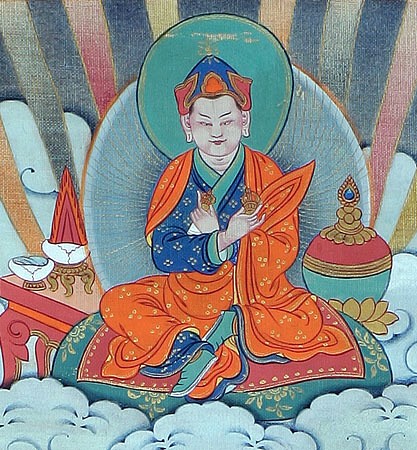Humkara: Difference between revisions
Jump to navigation
Jump to search
mNo edit summary |
No edit summary |
||
| Line 2: | Line 2: | ||
'''Humkara''' (Skt. Hūṃkara; Tib. ཧཱུྃ་ཀ་ར་, [[ཧཱུྃ་མཛད་]], [[Wyl.]] ''hUM ka ra'' or ''hUM mdzad'') — one of the [[eight vidyadharas]] of India; he received the Vishudda (Tib. [[Yangdak Heruka]]) tantra from the [[Kagyé]] cycle. | '''Humkara''' (Skt. Hūṃkara; Tib. ཧཱུྃ་ཀ་ར་, [[ཧཱུྃ་མཛད་]], [[Wyl.]] ''hUM ka ra'' or ''hUM mdzad'') — one of the [[eight vidyadharas]] of India; he received the Vishudda (Tib. [[Yangdak Heruka]]) tantra from the [[Kagyé]] cycle. | ||
==Further Reading== | |||
*[[Dudjom Rinpoche]], ''The Nyingma School of Tibetan Buddhism'', trans. and ed. Gyurme Dorje (Boston: Wisdom, 1991), pages 475-477. | |||
[[Category:Eight Vidyadharas]] | [[Category:Eight Vidyadharas]] | ||
[[Category:Indian Masters]] | [[Category:Indian Masters]] | ||
Revision as of 15:59, 6 January 2012

Humkara (Skt. Hūṃkara; Tib. ཧཱུྃ་ཀ་ར་, ཧཱུྃ་མཛད་, Wyl. hUM ka ra or hUM mdzad) — one of the eight vidyadharas of India; he received the Vishudda (Tib. Yangdak Heruka) tantra from the Kagyé cycle.
Further Reading
- Dudjom Rinpoche, The Nyingma School of Tibetan Buddhism, trans. and ed. Gyurme Dorje (Boston: Wisdom, 1991), pages 475-477.